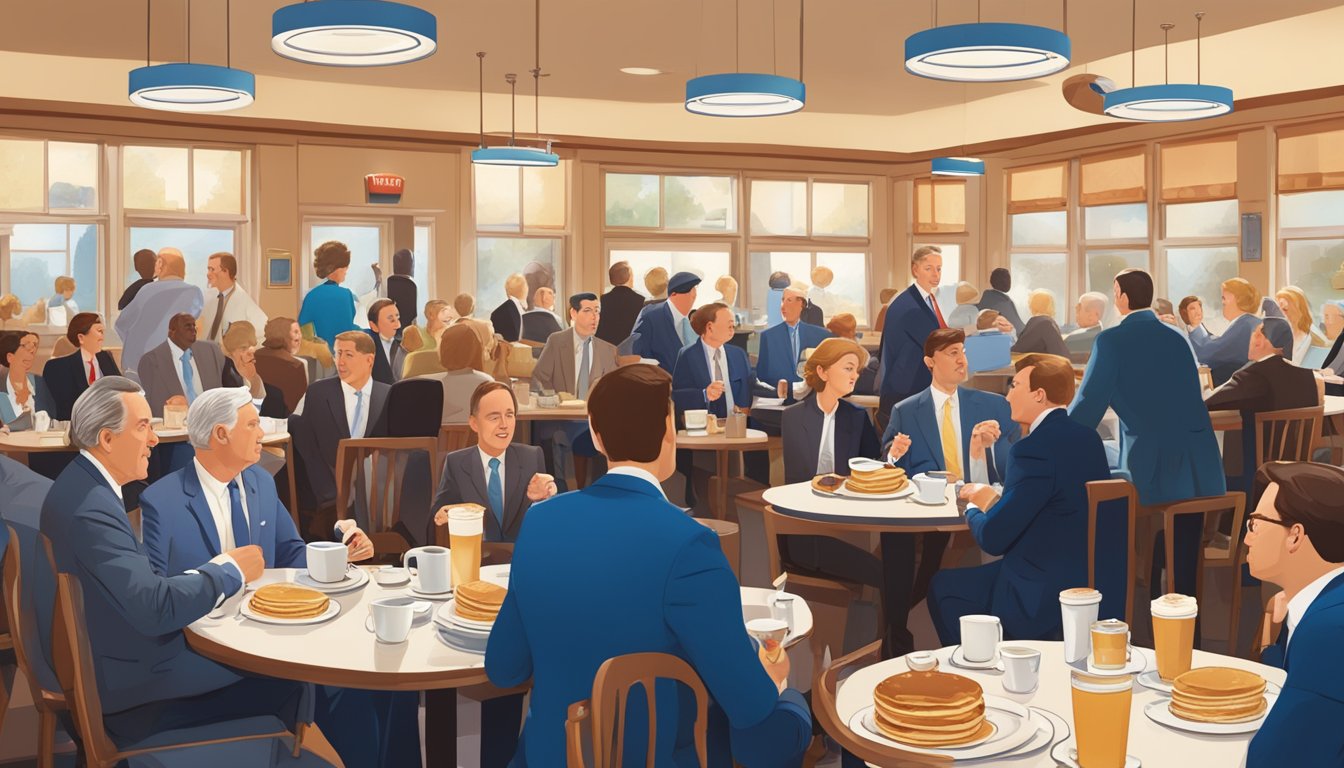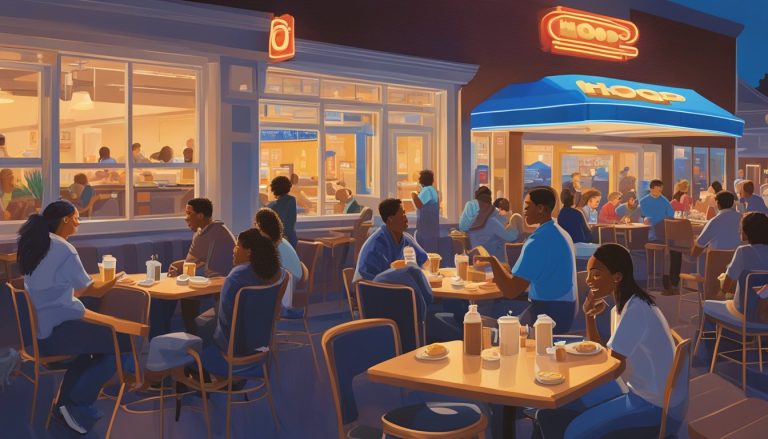Politicians have long recognized the power of sharing a meal to build relationships and forge alliances. While fancy state dinners often come to mind, casual breakfast spots like IHOP have become unexpected venues for political dealmaking and damage control.
Several high-profile political scandals and negotiations have unfolded over pancakes and coffee at IHOP locations across the United States. From clandestine meetings to public apologies, the familiar comfort food setting provides a relatable backdrop for politicians to connect with constituents or hash out agreements with opponents.
The appeal of IHOP for political encounters lies in its accessibility and mainstream image. By choosing a popular breakfast chain, politicians aim to appear down-to-earth and in touch with everyday Americans. This strategy can backfire, however, as evidenced by recent controversies involving political figures at IHOP restaurants.
Historical Context of Breakfast Meetings

Breakfast meetings have played a significant role in political and business interactions for decades. These early morning gatherings provide a unique setting for discussions and negotiations.
The Origin of Breakfast Diplomacy
Breakfast diplomacy emerged in the mid-20th century as politicians sought informal venues to connect. The practice gained prominence during World War II, with leaders using morning meals to build alliances and discuss strategy.
In the 1950s and 1960s, breakfast meetings became a staple of Washington D.C. politics. Presidents like Eisenhower and Kennedy regularly hosted these gatherings to foster bipartisanship and tackle pressing issues.
The casual atmosphere of breakfast allowed for more relaxed conversations. It provided a neutral ground for opposing parties to find common ground over coffee and pancakes.
Evolution of IHOP as a Political Hub
IHOP’s rise as a political meeting spot began in the 1960s. The chain’s 24-hour service and widespread locations made it an ideal venue for late-night strategy sessions and early morning meetings.
Local politicians often chose IHOP for its affordability and familiar menu. The restaurants became unofficial campaign headquarters during election seasons.
By the 1980s, IHOP had solidified its place in political culture. Presidential candidates made stops at IHOP locations to connect with voters and demonstrate their down-to-earth appeal.
IHOP’s consistent presence across the country provided a familiar setting for politicians on the campaign trail. It became a symbol of grassroots America, where leaders could engage with constituents over breakfast classics.
Politics on the Menu

IHOP has become an unexpected venue for political gatherings and discussions. The casual atmosphere and classic American breakfast fare create a relaxed setting for politicians to connect with constituents and colleagues alike.
Famous Political Gatherings at IHOP
Barack Obama made headlines during his 2008 presidential campaign by stopping at an IHOP in Spartanburg, South Carolina. He ordered scrambled eggs and chatted with patrons, demonstrating his everyman appeal. In 2012, Mitt Romney held a breakfast meeting with supporters at an IHOP in Illinois, discussing campaign strategy over pancakes and coffee.
Local politicians frequently use IHOP locations for town hall meetings. These events allow constituents to voice concerns while sharing a meal. The informal setting helps break down barriers and fosters open dialogue.
Menu Items Named After Politicians
IHOP has occasionally introduced menu items inspired by political figures. The “Obama Special” briefly appeared at some locations in 2009, featuring a stack of pancakes with a side of bacon and eggs.
In 2016, a franchisee in New Hampshire created red, white, and blue pancakes dubbed the “Trump Tower” during primary season. The colorful stack garnered media attention and sparked debate about political endorsements in restaurants.
Some locations have playfully renamed existing dishes during election seasons. “Left-Wing” and “Right-Wing” chicken and waffle platters have appeared as limited-time offerings, allowing diners to literally vote with their forks.
The Role of Food in Political Dialogue

Food serves as a powerful facilitator for political discussions, creating an atmosphere of familiarity and comfort. It helps break down barriers and fosters more open, productive conversations between leaders and officials.
Common Ground and Shared Meals
Politicians often use meals as a way to find common ground with colleagues and constituents. Sharing a plate of hash browns or sweet pancakes at IHOP can humanize public figures and make them more relatable.
Family-style dining encourages a sense of community and shared experience. This informal setting allows for more candid exchanges of ideas and perspectives.
Leaders frequently choose restaurants that reflect local culture or showcase regional specialties. This demonstrates cultural awareness and respect, which can be crucial in diplomatic relations.
Impact of Casual Dining on Political Conversations
Casual dining establishments like IHOP provide a relaxed environment for political dialogue. The informal atmosphere often leads to more open and honest discussions compared to formal settings.
Politicians may use these venues for lunch or dinner meetings to discuss sensitive topics away from the public eye. The background noise and bustling activity can offer a layer of privacy.
Casual restaurants also allow politicians to connect with everyday voters. Engaging with constituents over a meal can provide valuable insights into local concerns and priorities.
These informal settings can help defuse tensions between opposing parties. Sharing a meal can create a temporary truce, allowing for more productive negotiations and compromise.
Branding and Marketing Dynamics

IHOP’s bold marketing strategies have shaped public perception and sparked widespread discussion. The brand’s innovative approaches leverage social media to engage customers and create buzz around new offerings.
IHOP’s Rebranding to IHOb: A Strategy or Stunt?
In 2018, IHOP temporarily rebranded to IHOb, changing its iconic name to “International House of Burgers.” This move generated significant attention and controversy. The campaign aimed to highlight IHOP’s expanded menu beyond breakfast, particularly its new line of burgers.
The rebrand sparked intense debate on social media platforms, especially Twitter. Many users expressed confusion or criticism, while others praised the bold marketing tactic. Despite initial skepticism, the campaign successfully increased awareness of IHOP’s lunch and dinner options.
Dine Brands, IHOP’s parent company, reported a surge in burger sales following the promotion. The temporary name change effectively drew attention to the chain’s non-breakfast offerings without alienating its core breakfast-loving customer base.
The Influence of Social Media on Brand Perception
Social media platforms play a crucial role in shaping IHOP’s brand image. The company actively engages with customers on Twitter, Instagram, and Facebook, sharing enticing food photos and responding to customer feedback.
IHOP’s social media strategy focuses on creating shareable content that resonates with its target audience. The brand often posts images of stacked pancakes, syrup-drenched waffles, and indulgent desserts to appeal to food enthusiasts.
During the IHOb campaign, IHOP’s Twitter account became a hub of activity. The brand responded to comments with humor and wit, further amplifying the campaign’s reach. This interactive approach helped IHOP maintain a positive brand image despite the controversial name change.
IHOP continues to use social media to promote new menu items, limited-time offers, and seasonal specials. By maintaining an active and engaging online presence, the brand keeps customers informed and interested in its evolving offerings.
Nutritional and Dietary Considerations

Politicians’ breakfast choices at IHOP can have significant impacts on their health and performance. The nutritional content of popular menu items varies widely, with both healthier and more indulgent options available.
Analyzing the Nutritional Content of Politician’s Favorites
IHOP’s signature pancakes, while delicious, are high in carbohydrates and calories. A standard stack contains around 750 calories and 100g of carbs. Adding syrup increases these numbers substantially.
Bacon provides protein but is high in saturated fat and sodium. A typical serving has about 200 calories and 500mg of sodium.
Eggs offer a protein-rich option with about 70 calories each. They contain essential nutrients like vitamin D and choline.
Healthier choices include oatmeal, egg white omelets, and fresh fruit sides. These provide more balanced nutrition with fewer calories and less saturated fat.
Breakfast as the Most Important Meal in Politics
A nutritious breakfast can enhance cognitive function and energy levels, crucial for politicians facing long days of meetings and negotiations.
Protein-rich options like eggs may help maintain stable blood sugar and improve focus throughout the morning.
Whole grain choices provide sustained energy and fiber, potentially reducing mid-morning cravings and supporting digestive health.
Balancing indulgent choices with healthier sides can allow politicians to enjoy IHOP visits while maintaining their health and public image.
Dietitians recommend pairing pancakes with egg whites or turkey bacon to add protein without excessive calories or saturated fat.
The Cultural Impact of Breakfast Diplomacy

Breakfast diplomacy has expanded beyond political circles, influencing business meetings and social gatherings. IHOP’s role in American culture has become intertwined with political imagery and casual dining traditions.
Breakfast Meetings Beyond the Political Arena
Business leaders have adopted the breakfast meeting format popularized by politicians. Many executives now prefer early morning gatherings at casual dining spots to discuss deals and strategy. Family-owned businesses often choose IHOP for informal board meetings, combining business with a comforting meal.
Some corporations have created dedicated breakfast spaces in their offices, mimicking the IHOP aesthetic. These areas foster a relaxed environment for brainstorming sessions and team building activities.
Non-profit organizations have also embraced breakfast diplomacy. Many now host fundraising breakfasts, inviting donors to connect over pancakes and coffee.
IHOP in American Culture and Politics
IHOP has become a symbol of grassroots political engagement. Candidates often choose IHOP locations for meet-and-greets with constituents, leveraging the restaurant’s casual atmosphere.
The chain’s ubiquity has made it a barometer for political trends. Analysts sometimes gauge public opinion by observing patron demographics and conversations at IHOP locations across the country.
IHOP’s menu has even influenced political discourse. Terms like “short stack diplomacy” have entered the political lexicon, referring to informal negotiation tactics over a simple meal.
Family outings to IHOP after church or school events have become a cultural touchstone. This tradition often intersects with local politics, as community leaders are frequently spotted dining with their families.




